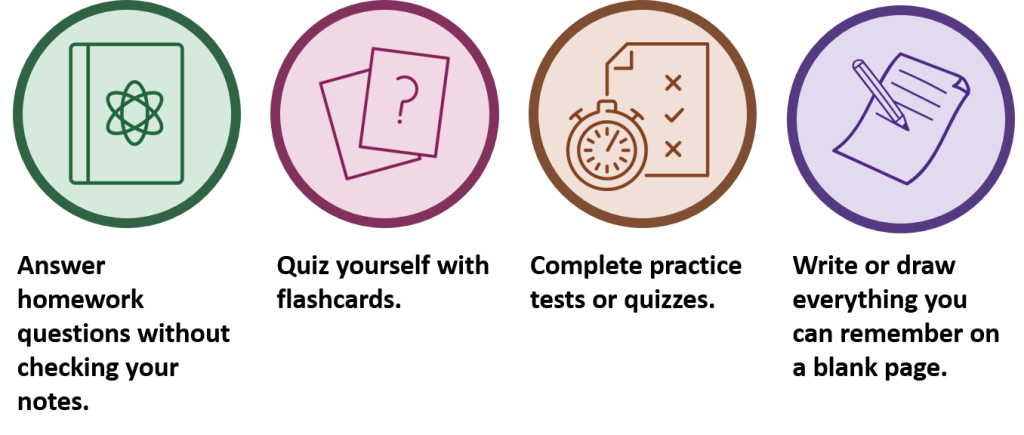Exploring Retrieval Practice

Exploring Retrieval Practice
Retrieval practice is part of each of the strategies outlined in prior modules. It requires to students to actively bring information back to mind from their long-term memory.
Learning Outcomes
After completing this module, you will be able to demonstrate the following:
- Explain the principle of retrieval practice
- Describe how retrieval practice improves learning
- Identify the barriers to using retrieval practice
- Demonstrate how to use interactive learning tools to support retrieval practice
Understanding Retrieval Practice
Retrieval practice involves actively and purposefully recalling information from memory. When students work at recalling information they connect pieces of information together, like a path across the brain. Each time the student attempts to recall that piece of information, the connections grow stronger and more connections are made, enabling the student to recall the information faster and with greater ease. Deliberate retrieval practice thus makes it easier for students to draw upon connections and apply their knowledge in future situations. In turn, this promotes deep, durable, and transferable learning.
Retrieval can be practiced when students complete their homework, quiz or self-test themselves, or try to recall information from memory.

Retrieval Practice – Video
The following two minute video is an introduction to retrieval practice. It explores what retrieval practice is and how it can support students in their learning. Feel free to include this short video into your own courses to guide students as they explore effective learning techniques. You can find this video at the following link Tactic 6: Retrieval Practice Video
The following are some interesting and creative ways to use this video:
- Embed it in a review quiz
- Present it in class and explore with your students different methods they have used to engage in retrieval practice in their previous study sessions
- Build some retrieval practice opportunities and explicitly discuss how these opportunities are connected to the science of learning
Retrieval Practice – Infographic
You may want to share this infographic with your students to help them understand how they can use retrieval practice for learning:
Retrieval Practice Infographic.pdf
Attribution- Creative Commons-NonCommercial-NoDerivs by The Learning Scientists
Barriers to Retrieval Practice
Within this section we explore some roadblocks that can prevent students from engaging in this particularly learning technique. These can be used in a number of ways:
- establish a reflective checklist for students to assist them in assessing their previous habits and methods of studying
- support discussions about progress and next steps with students
- as a means of feedback to support students while they build their competency with learning
Resistance to Using Retrieval Practice
- Habit or established instructional practices: instead of providing retrieval practice activities, instructors provide assessments.
- The initial struggle to recall information makes students feel that the strategy is not working and so they abandon the strategy.
- Instructors must provide feedback so that students can correct their mistakes.
Challenges Students May Face Using Retrieval Practice
- Students do not actually actively practice recall, but simply read the question and immediately flip to the answer without pausing to consider the answer.
- Students ask the same questions in the same order every time, resulting in prediction and rote memorization, instead of durable learning.
References
Photography on this page used with permission from the Durham College Online Photo Database.
Dunlosky, J. (2013). Strengthening the Student Toolbox: Study Strategies to Boost Learning. American Educator., 37(3), 12–21. https://files.eric.ed.gov/fulltext/EJ1021069.pdf
Dunlosky, J., Rawson, K.A., Marsh, E.J., Nathan, M.J., & Willingham, D.T. (2013). Improving students’ learning with effective learning techniques: Promising directions from cognitive and educational psychology. Psychological Science in the Public Interest, 14(1), 4-58. https://doi.org/10.1177/1529100612453266
InnerDrive. (n.d.) How to design the perfect multiple choice test. InnerDrive. https://blog.innerdrive.co.uk/perfect-multiple-choice-test
InnerDrive. (n.d.) The 6 benefits of retrieval practice – a visual guide. InnerDrive. https://blog.innerdrive.co.uk/6-benefits-of-retrieval-practice
Karpicke, J. D., & O’Day, G. M. (in press). Elements of effective learning. In M. J. Kahana & A. D. Wagner (Eds.), Oxford Handbook of Human Memory, Volume II: Applications. Oxford University Press. https://learninglab.psych.purdue.edu/downloads/inpress_Karpicke_ODay_Oxford_Handbook.pdf
Pan, S.C. (n.d.). Retrieval practice (Practice testing). UC San Diego Psychology. https://psychology.ucsd.edu/undergraduate-program/undergraduate-resources/academic-writing-resources/effective-studying/retrieval-practice.html
Roediger III, H. L., & Butler, A. C. (2011). The critical role of retrieval practice in long-term retention. Trends in Cognitive Sciences, 15(1), 20-27. https://doi.org/10.1016/j.tics.2010.09.003
The Learning Scientists. (n.d.). Retrieval practice. The Learning Scientists. https://www.learningscientists.org/retrieval-practice
Weinstein, Y., Madan, C.R. & Sumeracki, M.A. (2018). Teaching the science of learning. Cognitive Research: Principles and Implications, 3(2). https://doi.org/10.1186/s41235-017-0087-y
Weinstein Y., & Smith, M. (2016, June 23). Learn how to study using… retrieval practice. The Learning Scientists. https://www.learningscientists.org/blog/2016/6/23-1
© Durham College. All rights reserved.

